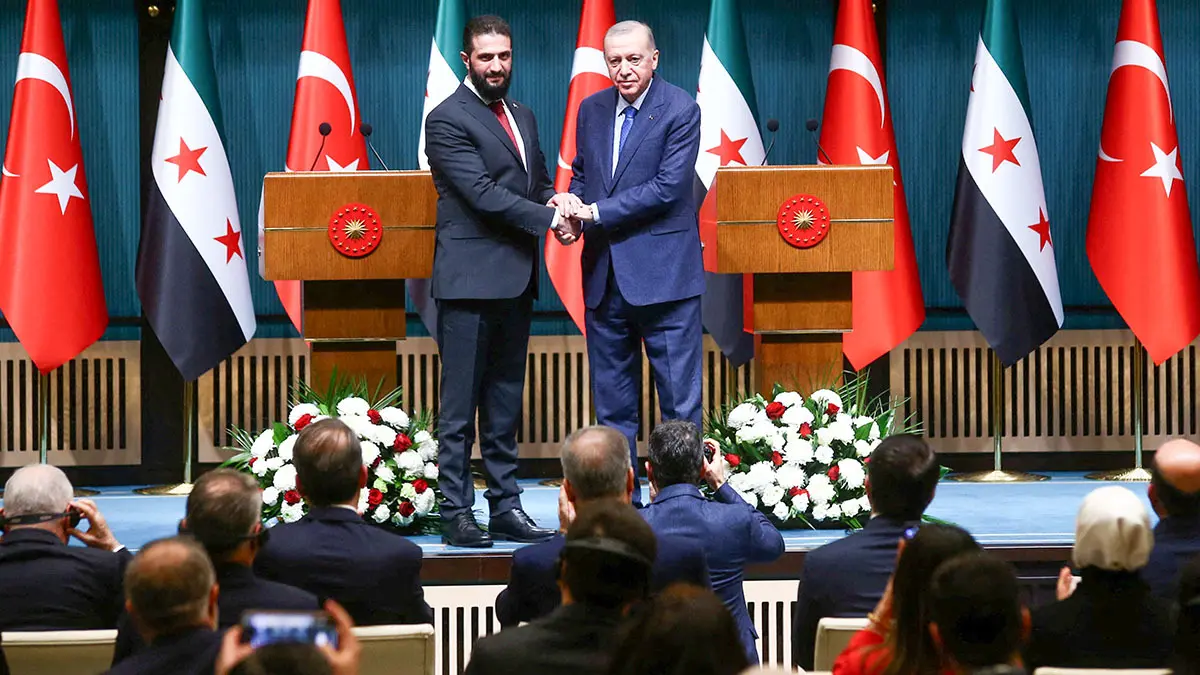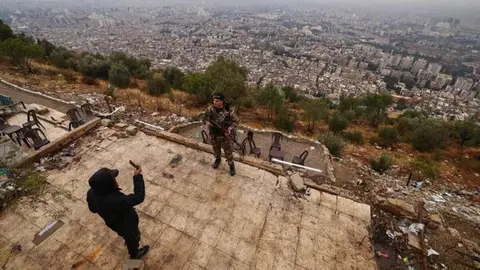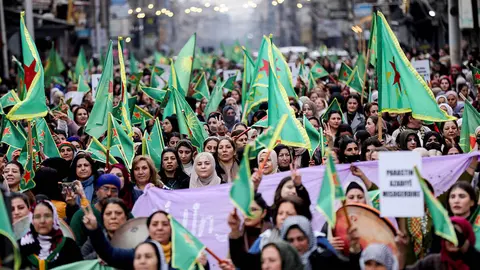Turkey’s strategic game in Syria

Strategic borders are what determine the current state of relations between Turkey and Israel regarding Syria. The Turkish border, if one takes Deraa as an example, is the Golan Heights border overlooking Israel. The Israeli border, by this measure, extends across all of Syria, although there are no concrete borders.
The Turks are well aware of this. Turkish President Recep Tayyip Erdogan considers what he has gained in Syria a strategic breakthrough. He did not, of course, enter into competition with the Israelis. He merely exercised strategic patience in achieving his goals in Syria. Then, the fruits of his patience began to fall into his basket as he harvested what he sought from his endeavour. There is no doubt that he was smart enough not to rush. Erdogan decided to take advantage of the fall-outs of the “Al-Aqsa Flood” catastrophe, first on the Palestinians and then on Hezbollah. It is still too early to assess the extent of his overall gains, but Syria has fallen completely into Turkey’s hands.
Another key factor in Syria’s fall into the Turkish lap is the role played by an important player in ensuring continued funding for the Turkish project since 2012. We are talking about the Qataris who now feel more than ever that they can connect the Arabian Gulf to the Mediterranean through Syria. This is something akin to the Shia Crescent which Iran has dreamed of building to connect Tehran to the shores of the Mediterranean. Syria is a pivotal country geographically, culturally and politically. The Turks see it as an historical extension of all their ambitions.
For the Qataris, who view themselves as a rising power buttressed by money and politics and by the inability of others, especially their Gulf rivals, to keep up with them politically, Syria is a double win for them, especially since they invested heavily early on in the project, and now the time has come for them to reap the benefits.
It is safe to assume there is no real crisis pitting the Turks against the Israelis over Syria. The two sides have coexisted uneventfully throughout the years during Syria’s civil war. The Russians managed to coordinate the relationship very well. Frictions between them have been minimal. The result was that Bashar al-Assad’s regime adapted to realities in the south. One can say that the situation there, that is, along the Golan Heights border, has always been better than the situation in the north, primarily due to the Kurdish factor.
With the arrival of Ahmed al-Sharaa’s government in Damascus, and all the gains this has implied for Turkey in general and for Erdogan in particular, conditions are more propitious than ever for coordination between Turkey and Israel.
One should set aside the anti-Israel rhetoric by Turkey’s senior officials against the background of developments in Gaza, as this will sooner or later fade away. There is no real animosity between Israel and Turkey. The type of political Islam that guides Turkey today is a quiet version that Israel knows is harmless and can live with.
President Sharaa is well aware of this and is acting accordingly. Turkish statements of the past few days have to be seen within this context. What we heard from Turkish Foreign Minister Hakan Fidan confirms this impression. Israeli air strikes may have targeted Syrian airports and destroyed the remnants of fortifications abandoned hastily by the regime when Bashar al-Assad decided to save himself and his family at the cost of the regime’s survival. All that the Turks need is a coordination process with the Israelis over modalities. Fidan himself has hinted at this by saying that Ankara did not mind the new Syrian regime making arrangements to coexist with Israel.
The Syrian Islamists who rule Syria today are not about to open the door to hostilities with the Israelis, and it is clear that the Turks are encouraging them to work towards an acceptable peace formula. It is still too early to talk about peace between Syria and Israel, but hints from Fidan are clear and unmistakable.
Let us put aside two Turkish crises. The first is the internal political crisis related to Erdogan’s own political face-off with his political opposition, culminating in the authorities’ arrest of the president’s most prominent opponent, the mayor of Istanbul, Ekrem Imamoglu. This is no small crisis, which Erdogan will not be able to overcome easily. This is why he framed the Imamoglu issue as a purely legal case, describing it in terms of contractual irregularities and embezzlement. He has spared no effort to de-politicise the issue and turn it into a corruption case.
The second crisis is less recent. Turkey is experiencing a major economic downturn. The country ruled by Erdogan is not today the way it was, let us say, ten years ago. Turkey is now burdened by debt and is trying to resolve its problems with formulas that have yet to yield results.
But Erdogan is a skilled, if not cunning, politician who has always been able to separate the regional realm from his domestic political and financial problems. The regional interests of Turkey take precedence over other considerations. In this regard, rarely do we hear a domestic voice rising to oppose him, even during the worst days of Ankara’s dispute with regional countries, be they Saudi Arabia, the UAE or Egypt.
The Turks believe their country has a political role to play and must remain the dominant power in the Eastern Mediterranean, if not the whole Mediterranean. If one adds sensitivities in the region, which are fuelled by fear of shifts over the Kurdish issue, Erdogan has absolute freedom to implement whatever decisions he deems to be in Turkey’s higher interest. This is an ideal situation for a leader with a regional agenda like Erdogan.
All things considered, the Israeli bombing of military bases in Syria serves the interests of Erdogan and does not conflict with his goals. In fact, it provides the Turkish president with a narrative he can use whenever he wants to accuse the Israelis of targeting him for defending Palestinian rights. Never mind the fact that Turkish F-16s are periodically serviced in Israel based on ongoing contracts. This detail can be conveniently swept under the rug. Did the Turks try, since the launch of “Al Aqsa Flood” to outbid any other actor? This certainly was not the case, even if Israeli bombs were falling on the Muslim Brotherhood militants of Hamas, who are the closest group to the hearts of Turkish Islamists.
In such an environment, Erdogan can present his regional policies in the best of light while fulfilling his most important ambition, one he has sought for years, which is to achieve complete control over Syria.
Ahmed al-Sharaa offers Erdogan a golden opportunity to achieve his ambitions. It is difficult to say whether the two men met several times, or whether they even met at all before Sharaa’s major transformation from Abu Muhammad al-Golani to Ahmed al-Sharaa, and from the leader of a powerful al-Qaeda-affiliated armed faction to a president whose presence among leaders of the world is now deemed acceptable. Sharaa even provides Syria with the opportunity to emerge from the dark tunnel into which the Bashar al-Assad regime has plunged it through his endless series of idiocies.
The anticipated coordination between Turkey and Syria is the fruit of significant and extensive strategic planning between the Turks and Qataris. It represents an exceptional development for a country which the Arabs have deliberately neglected and in doing so failed to answer the question: Who bears responsibility for neglecting Syria so long and then came around to accuse Erdogan of being an opportunist? Was Erdogan an opportunist or were others masters of missed opportunities?
It is a golden opportunity, given Syria’s vast potential. Geography may be the most immediate asset. Beyond that, Syria is an important gateway to the rest of the region, both politically and culturally. Today, with the significant economic opportunities it offers and medium size population, Syria stands at a crucial turning point which is not to be underestimated. Even politically, one can wonder what would happen if Syria engaged the peace process (and not necessarily normalisation, as some would like to depict it by deliberately distorting the nature of the conflict in our region).
A regional peace which includes Syria is no small matter, because it would once and for all preempt any outbidding by a country like Iran (which was undoubtedly exploiting a naive leader like Bashar al-Assad) and prevent Tehran from claiming it is fighting Israel and Zionism while unscrupulously taking advantage of others in the region.
Sharaa remains a mysterious figure, not at least for many Syrians. But Erdogan seems capable of directing him as he pleases. He is able to do so in more since the transition of power. One can consider the complex bureaucratic transition currently under way, between the state bureaucracy left behind by Assad and the state bureaucracy which Sharaa is taking over. The atmosphere is ironically similar to the one over a century ago, when the Ottoman government bureaucracy morphed into a new Syrian government bureaucracy.
Turkey, which is assessing Syrian air bases and trying to chart its own course in the aftermath of the Syrian civil war, will not rush to react over what the Israelis are doing. Nor are the Israelis planning major responses over what they might hear from Sharaa or his government regarding their air strikes and displays of arrogance.
There is today a process where the maps of the region are being redrawn, and this requires a great deal of patience and prudence. The Turks and the Israelis understand this. And because Sharaa and members of his government realise that they are at the centre of the game of nations and its fateful maps, it is not surprising that they prefer to keep silent about the Israeli raids. No one wants to be carried away by the “Floods,” which have brought the region to its current desolate state. Call this silence, or calm, as you will. But the idea that Turkey is on Israel’s border, and not the other way around, gives those redrawing the region’s maps ample time to ponder the issues without anyone feeling the need to rush anything.



